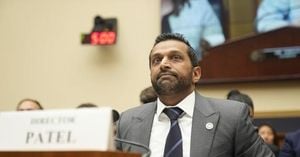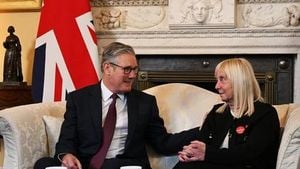Björn Höcke, the controversial leader of the Alternative for Germany (AfD) faction in the Thüringen state parliament, is reportedly planning to resign from his position as county chief after the next board election, scheduled for autumn 2026. This anticipated move indicates significant changes within the party as Höcke, one of its most recognizable figures, steps back from active leadership due to discontent with his role.
"Er ist die Rolle leid, immer dagegen zu sein," said an anonymous friend of Höcke, referring to his dissatisfaction with continually opposing policies rather than being part of the ruling process, as reported by Table.Media. It seems this sentiment has grown over time, culminating in discussions about his future direction within the party.
Despite planning to step down, Höcke will maintain his position as the faction leader for now, but sources within the AfD suggest he is open to transitioning leadership roles to others. There is talk of his potential candidacy for different responsibilities, particularly as discussions about the future of the party become more pressing.
The backdrop of Höcke's resignation discussions includes fears from some within the party of unprecedented challenges, such as the possibility of the Thüringen AfD branch facing bans. The Deutsche Institut für Menschenrechte (DIMR) recently increased pressure by stating, "Das Instrument des Verbotsverfahrens einer Partei ist aus historischer Erfahrung für eine Situation wie die jetzige geschaffen worden," highlighting the growing danger perceived by authorities against the party’s continuing existence due to radical elements within.
On the ground, tensions are rising as the AfD plans to hold a remembrance event this Friday at 4 PM, coinciding with serious incidents of violence recently witnessed in the region. Höcke announced via social media, "Wir sehen uns in Aschaffenburg," signaling the party's commitment to its agenda amid opposition protests.
Local groups, including the Interventionistische Linke, are organizing to counter the AfD's appearance, stating, "Die AfD instrumentalisiert die Opfer! Wir stellen uns dagegen." This shows the stark divide within the community related to the AfD's activities and its public reception.
While Höcke's future may be uncertain, the party dynamics remain contentious. Suggestions for potential successors to Höcke’s position include Rene Aust, the head of the AfD faction in the European Parliament; Daniel Haseloff; and Wiebke Muhsal, both existing members of the Thüringen AfD faction. Each brings their own vision of the future, as the party appears at the crossroads of survival and adaptation.
Much remains at stake heading toward 2026 as the AfD navigates its internal leadership questions against the backdrop of political and public resistance. The discourse around the party suggests they are grappling for relevance as they face scrutiny both from broader society and potential regulatory outcomes.
The road forward for the AfD and its members, especially considering reigning public sentiments, may dictate how the party evolves or fragments over the coming years. What is clear is Höcke's potential resignation marks merely the beginning of much broader challenges for the AfD as they seek to maintain their foothold in German politics.



